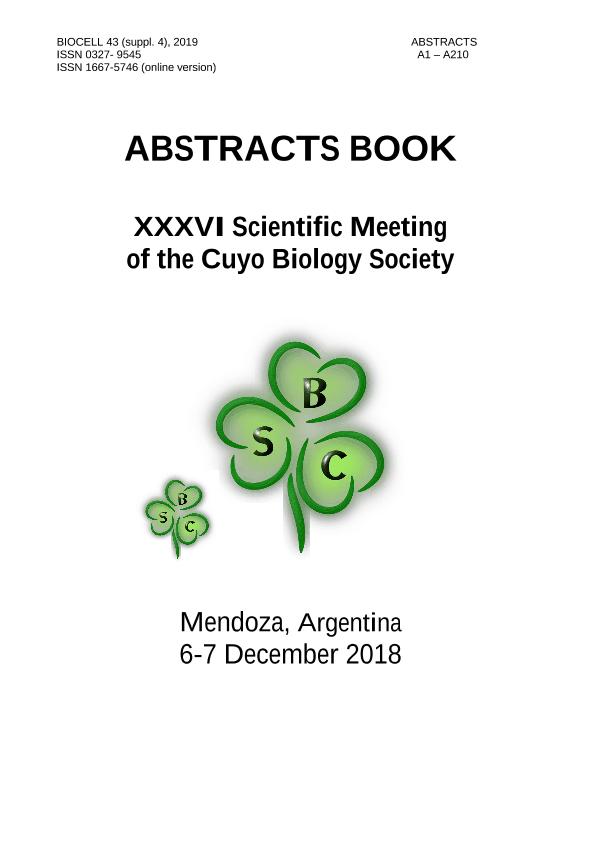Evento
A specific MLH1 gene mutation in families from Mendoza associated with lynch syndrome
Mampel, Alejandra; Cambados, N.; Valdemoros, Paula; Vargas, Ana Lía; Hidalgo, J.; Nadin, Silvina Beatriz

Tipo del evento:
Reunión
Nombre del evento:
XXXVI Reunión Científica Anual de la Sociedad de Biología de Cuyo
Fecha del evento:
06/12/2018
Institución Organizadora:
Sociedad de Biología de Cuyo;
Título de la revista:
Biocell
Editorial:
Tech Science Press
ISSN:
0327-9545
e-ISSN:
1667-5746
Idioma:
Inglés
Clasificación temática:
Resumen
Lynch syndrome (LS) is the most common cause of hereditary colon cancer which predisposen to colorectal, endometrial, and other cancers. LS is caused by germline mutations in the mismatch repair (MMR) genes (MLH1, MSH2, MSH6, and PMS2). The MMR system detects and corrects replication errors, maintaining the stability of the genome. Consequently defects in the MMR increase the mutation rate causes microsatellite instability (MSI) and increased cancer risk. The main objective of our study was to analyze clinical characteristics and diagnostic algorithms of two unrelated families from Mendoza, Argentina, carrying a specific mutation in MLH1 gene. The clinical importance of these mutations and their significance in the general population were also examined. After carrying out the genealogical study, MMR proteins MLH1, MSH2, MSH6 and PMS2 were evaluated in paraffin-embedded tissue sections from colorectal tumors using Ventana Benchmark automated immunostaining. MSI analysis was performed using STRs markers (NR-21, NR-24, BAT-25, BAT-26 and Mono-27) and Illumina next-generation sequencing (NGS). Family characteristics and evidences are presented below. Family A: a male patient, 36 years old, with right-sided colon cancer and MLH1/PMS2 proteins absent by immunohistochemistry (IHC). Two sisters with colorectal cancer before 40 years of age. The father and the paternal grandmother died from colon cancer. A pathogenic mutation was localized in MLH1 c.1890dupT (p.Asp631Ter1) by NGS. Family B: a 33-year-old male patient with right-sided colon cancer. IHC staining showed the absence of MLH1 expression. The patient also presented MSI. The mother had endometrial and colon cancer, a maternal uncle had colon cancer and papillary urothelial carcinoma, and the maternal grandfather had colon cancer. Using NGS, a mutation in MLH1 c.1890dupT (p.Asp631Ter1) was found. Our results demonstrate the important implications of clinical and molecular algorithms to improve the efficiency of LS diagnosis, as well as the detection of asymptomatic carriers. These data allow to established guidelines for the follow-up, risk-reduction management and treatment strategies for patients found to has pathogenic mutations. In addition, our data contribute to determine frequencies of specific mutations in the general population. The mutation of the MLH1 gene described above is prevalent among families with LS in South America.
Palabras clave:
DNA DAMAGE
,
CISPLATIN
,
CANCER
,
HSP27
Archivos asociados
Licencia
Identificadores
Colecciones
Eventos(IMBECU)
Eventos de INST. DE MEDICINA Y BIO. EXP. DE CUYO
Eventos de INST. DE MEDICINA Y BIO. EXP. DE CUYO
Citación
A specific MLH1 gene mutation in families from Mendoza associated with lynch syndrome; XXXVI Reunión Científica Anual de la Sociedad de Biología de Cuyo; Mendoza; Argentina; 2018; 30-30
Compartir



